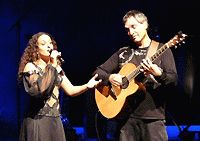AVIVA-Berlin >
Music > backstage
AVIVA-BERLIN.de im Februar 2026 -
Beitrag vom 12.12.2008

Interview with Noa on her new Album Genes and Jeans
Margret Mû¥ller
Growing up as a Yemenite Israeli in New York, returning to Israel for love, and performing all over the world, Noa`s latest album is a journey to her past and future, as a granddaughter and mother
Copyright Pictures: Sylvia van der Woude
AVIVA-Berlin:Your new album "Genes and Jeans" is very touching and personal. There is lots of family in it. What is the background of this journey to find your Yemenite family roots and the mixture of the different cultures in you that are reflected in the album?
Noa The album is a personal album in a sense that it is drawn very deeply from my family`s experience and my own experience as child of this family. My family`s sense of movement is very strong. Having been born in Israel, knowing that I was Yemenite, while never having been there, and then growing up as a Yemenite Israeli child in America is probably the most important part of my identity, and has made me who I am today.
In this album I was not only interested in learning about the family`s story and understanding their motives but also learning more about the old Yemenite songs and trying to give them a more personal context. Fusing them with new English lyrics and music, which would make them more personal and closer to my own universe. (When I say "I" I always mean me and Gil Dor, we work together on all this album and we do everything together.)
In addition to that there were English songs written reflecting on all of that, on the Yemenite songs, their stories, the families story and on my own situation and my childrens situation. So it is really is going from the past to the future, in the end with the song "the balancing act" being dedicated to my children.
There are other songs that are dedicated specifically to my family. One is "Ayelet Chen" which is all about my grandmother. And the song "Dreamer" which is about my grandfather Yisrael. He had a very deep influence on me because he was a unique man for his generation and his time. He came as a young boy from Yemen and grew up in an agricultural situation. Despite that simple and religious upbringing he got into diamond cutting and politics. He was very charismatic, very active, a natural leader. And then he decided to leave Israel (before the family moved to America) to explore the world and see what is out there. He did not know English. He just had this wonderful charisma, courage and optimism, which brought him to the far corners of the earth and finally brought the family to America where he established a diamond business and my father got a sholarship for an American University. So we all came, that was the second migration. In the end most of the family came back to Israel, I was the first of them and now we are spread all over world. What I learned about him is actually in the lyrics of the song, they are very clear on that. He was a dreamer and was "running where the roads are broken and always singing where no words are spoken." He would not let anything stop him and he always believed in the goodness of men despite all the difficult things that happened to him throughout his life. And I inherited that quality from him.
|  |
Noa in concert |
AVIVA-Berlin: What were your expectations when taking off to the journey of your Yemenite origins?
Noa:Our idea was to base the album mostly on yemenite songs. It was interesting for us to find new ways to approach to this music. But after a while we decided to expand that. Not only just to Yemenite songs but also to songs reflecting on the Yemenite songs and on the personal family journey. The concept became more flexible and more personal. It was not right for me to just sing Yemenite songs. I did not feel confident enough to do that. What makes me unique is not performing Yemenite songs, as many people have done before me and I feel in a better way than me. But I can create this unique fusion between Yemenite, Hebrew and English, being as it is such an
accurate reflection of my life and my self and my story. I think that this specific thing is something that I am the only one that can do, from my own personal point of view and that makes it very unique and incredibly pleasurable.
This album is also made at my home studio. So my children were around all the time and my family members, like my parents which sing on the album too, and my grandmother, could come to the studio and sing and be there. It is very different from making an album in New York or Paris like I have done in the past. Like you said, a very personal album. I used the Yemenite songs taught by my grandmother and from there went to places that are more reflective of my own journey and the musical journey together with Gil. I should say about my grandmother herself that she came from Yemen to Israel as a very young girl. So her view of Yemen is also already through the eyes of growing up in Israel. She had a very difficult childhood and had to struggle all her life to survive. She is very unique and also relied on stories. It is very interesting for me to learn about that and reflecting the fact that the family had this kind of unique journey from place to place is really the reason that the songs sound that way. If I was the first generation after coming from Yemen, and we were only speaking Yemenite, it would be different. But since our family has been in Israel for almost three generations and has gone through all of these metamorphoses, then the music also has to have that shape. It cannot be different.
|  |
Noa and Gil Dor |
AVIVA-Berlin: It is more a reflection of youãÎ
Noa: Yes, myself with all these influences and also the kind of journey my family made.
Gil Dor: That is why we called it "Genes and Jeans".
AVIVA-Berlin: It sounds like intense work, putting so different music styles together. How was approaching the Yemenite music for you?
Noa: Some of these songs are very hard to learn. Although I heard them as a child, the Yemenite songs are hard to sing. I wanted to do it right, with the accent and the reflections, the rhythms. Some songs are 7/8 rhythms: that was also hard to learn, specially to sing English lyrics on the Yemenite rhythms. It is quite complicated, but it was fun and makes this album unique. Normally people are taking the original songs as they are, or we have seen many experiments taking dance beats or modern beats and putting the authentic songs on top. Ofra Haza and Madonna did that. But that is a different thing. What we did was at a much deeper level of taking the lyrics and their meaning rearranging them, trying to find the right rhythm for a song in a modern context. Not copy and paste two things, modern and old. It is not that simplistic. That is why it took a long time. We invested a lot of time in finding the right arrangement and context and instruments to accompany these songs. And we did the same thing for the original songs that appear on this album in order create the unified sound. We really enjoyed that process.
AVIVA-Berlin: The amount of work was worth it, since the outcome is truly amazing!
Please also read our interview with Noa on home, ambivalent Israeliness, peace activism, power-failures and Leonard Cohen as a mantra source for inner power and letting go the pursuit for perfection.
And our
review on the new album "Genes & Jeans"